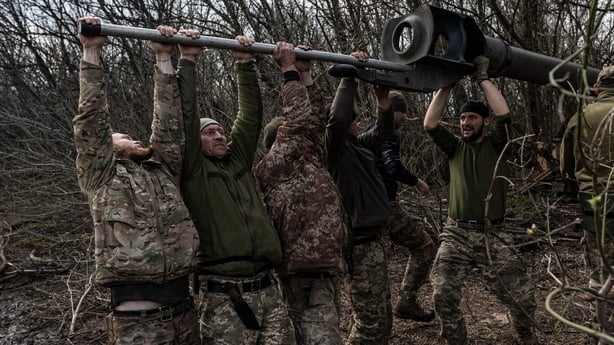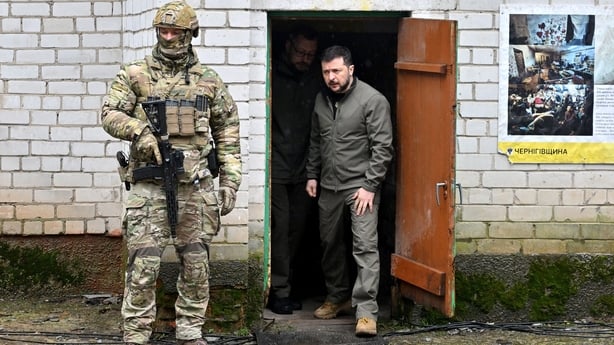Ukrainian and Russian forces battled in the streets of Bakhmut, eastern Ukraine's devastated "fortress" city, and Ukrainian soldiers said they were ready to launch their long-anticipated counter-offensive once the weather improved.
On the diplomatic front, French President Emmanuel Macron urged Chinese leader Xi Jinping during talks in Beijing to use his influence to persuade Russia to halt the war.
However, an adviser to Russian President Vladimir Putin rated the chances of peace talks starting this year at "zero".
The months-long battle for Bakhmut, one of the last urban centres in Ukraine's eastern Donetsk province yet to fall to Moscow, has proven one of the bloodiest of Russia's invasion, now in its 14th month.
"The battles for Bakhmut continue," said Andriy Yermak, a senior adviser to Ukrainian President Volodymyr Zelensky.
"They are underway in the streets, enemy attempts to encircle the city are failing. Our command fully control the situation with the defensive 'fortress'," he said, using the nickname Mr Zelensky gave to the city.

The leader of Russia's private Wagner militia, Yevgeny Prigozhin, said fighting was continuing in the west of the city.
"It must be said clearly that the enemy is not going anywhere," he said on his Telegram channel.
Western analysts have played down the strategic significance of Bakhmut but Ukraine has framed its dogged defence of what is now a completely destroyed city as a way of wearing down Russian forces. Both sides have suffered huge casualties there.
"Bakhmut is performing the key task of inflicting as many losses on Russia as possible and, most importantly, to prepare for a counter-attack to take place in late April-May," Pavlo Narozhniy, a Ukrainian military analyst, told NV Radio.
Fighting was also raging further south in Avdiivka, a town near the regional capital of Donetsk, he added.
In comments that seemed to confirm the importance of Crimea in any Ukrainian counter-offensive, an adviser to Mr Zelensky told the Financial Times in an interview that Kyiv would be willing to discuss the future of the Black Sea peninsula if its forces reached the boundary of Crimea.
"If we will succeed in achieving our strategic goals on the battlefield and when we will be on the administrative border with Crimea, we are ready to open (a) diplomatic page to discuss this issue," Andriy Sybiha said in the interview.
Read full coverage of Russia's invasion of Ukraine here
Soldiers manning the trenches near Bakhmut said they were ready for any counter-offensive.
"We are ready, we have to do it, the sooner, the better. The enemy must be chased away. At the moment we are waiting for the weather to change, the mud is an obstacle," Naza, a 21-year-old unit commander said.
Ukrainian military expert Vladyslav Selezniov said Ukraine would be able to defend positions in the more heavily built-up west of Bakhmut as long as their route to the west, the "road of life" for getting supplies in and wounded out, remained open.
Mr Zelensky said yesterday that Ukrainian troops could withdraw from Bakhmut if they risked getting cut off.

He was speaking on a trip to Warsaw where he said Poland, a close ally of his country, would help form a coalition of Western powers to supply warplanes to Kyiv.
Russia says its "special military operation" in Ukraine was necessary to protect its security against what it sees as a hostile and aggressive West.
Kyiv and its Western allies say Moscow is waging an unprovoked war aimed at grabbing territory.
Kremlin spokesman Dmitry Peskov on Thursday defended Moscow's recent decision to station tactical nuclear weapons in neighbouring Belarus, saying it was "NATO that is expanding towards Russia, not Russia that is taking its military infrastructure towards the borders of NATO".
His comments came two days after Finland, which shares a long border with Russia, joined NATO as its 31st member.

